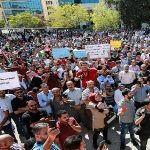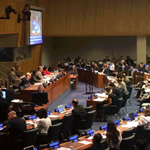Jordan
Published on Mon, 2020-11-02 15:27
As a result of longstanding failures in dealing with internal and external challenges, and in particular conditionalities imposed by IMF loans, Jordan has faced a large series of social and political protests in recent years. In the wake of increasing deteriorations of the economic situation, the demonstrations have received an enormous upswing and received public support from all segments of society.
The alternative report on Jordan, prepared by the Phenix Center for Economic Studies, describes the dynamics and the leading role of Civil Society Organizations (CSOs) during the demonstrations, and takes a look at the aftermath of the protests and upcoming challenges.
|
|
Jordan: Protests get results
As a result of longstanding failures in dealing with internal and external challenges, and in particular conditionalities imposed by IMF loans, Jordan has faced a large series of social and political protests in recent years. In the wake of increasing deteriorations of the economic situation, the demonstrations have received an enormous upswing and received public support from all segments of society.
The alternative report on Jordan, prepared by the Phenix Center for Economic Studies, describes the dynamics and the leading role of Civil Society Organizations (CSOs) during the demonstrations, and takes a look at the aftermath of the protests and upcoming challenges.
The numerous protests in Jordan achieved sustainable social and economic improvements in terms of better wages, working conditions and the dismantling of unjust regulations.
The unexpected outbreak of the Corona Virus is another challenge for the Jordanian health care system, and the for the productivity of the state itself. Mismanagement could exacerbate the already tense socio-economic which particularly affect the vulnerable population (such as migrants, informal workers and uninsured) who do not have the capacity and financial resources to seek medical help or unemployment benefits.
|
Published on Thu, 2020-05-14 12:11
The COVID-19 health crisis added to the multidimensional crises in the Arab region and their manifestation in conflicts, wars, economic and social inequalities, and the increasing number of refugees and migrants. It could lead to severe repercussions at the economic, social, and political levels. According to an ESCWA preliminary estimate, the region will lose at least USD42 billion in 2020 due to the Corona pandemic. ESCWA also considered that the global spread of the virus and the growing impact of low oil prices could aggravate income losses. Unemployment is expected to increase by 1.2 percentage points, meaning the loss of around 1.7 million jobs. The Arab region registers some of the highest rates of inequality around the world, and informal employment accounts for 50% of jobs. It also lacks universal social protection systems and is thus unable to protect workers and ensure their dignity during work stoppages.
|
Published on Sun, 2019-12-15 19:09
In Jordan the plans are good but just not implemented. The submission of the Voluntary National Review in 2017 was an opportunity "to further strengthen national ownership of the 2030 Agenda, build a proactive momentum around it, and accelerate its realization”. The preparation of the VNR “ensured the widest participation of all major groups and organizations” according to the report by the Phenix Center for Economic and Informatics Studies. This report was “a remarkable step forward in creating an inclusive strategy to achieve the SDGs” but “the lack of concrete and effective implementation of this strategy, as well as the failure in implementing an effective monitoring system, dramatically affected its effectiveness as a tool for integrating the SDGs in the national agenda”.
|
Published on Mon, 2019-05-13 12:06
Austerity is a major concern for civil society in Jordan. According to the alternative report by Ahmad M. Awad, from the Phenix Center, Measures of ‘fiscal consolidation’ started in 2016 as a condition to unlocking access to IMF aid. Austerity measures were thus implemented, leading to rises in fuel prices, as well as in both the sales taxes and customs.”
Nearly half of the Jordanian labour force works in the informal economy, which together with “the continued implementation of business-friendly labour policies, resulted in rising unemployment. Many began to see their ability to afford basic commodities threatened – a predicament termed 'transient poverty.' Among unskilled workers, waves of migrant workers and refugees (many desperate) have saturated the market – one hardly bound by any minimum-wage constraints – triggering a race to the bottom.” At the same time, “numerous political and legislative institutions had been severely weakened.
|
|
As controversial as it may still be for some, the historical involvement of the International Monetary Fund (IMF) in the development of Arab world countries over the past three or four decades—Jordan included—is a perfect of representation of the chronic foreign dependency of many of region’s (e.g., modern Levant) countries in the new millennium: A seemingly insurmountable dependency on support from bilateral and multilateral partners, under an almost permanent state of domestic or regional tension.
|
Published on Thu, 2017-08-31 12:30
Following 8 days involving 43 Voluntary National reviews (VNR) and 147 side events with 77 ministry-level participations and 2458 registered stakeholder representatives, the statistical outlook of the 2017 High-Level Political Forum on Sustainable Development Goals is quite promising. It is only the second review and just two years after the kick-off for the implementation of a universal agenda towards leaving no-one behind. Yet, time is marching on and there is a long way to go on the level of implementation.
At the 2017 HLPF, Jordan became the third country from the Arab region to participate in the VNR process; following Egypt and Morocco in the 2016 review. The first words of Jordan’s national report made reference to the same issues: ‘the power of working together’ and taking into consideration ‘the urgent world issues’.
|
Published on Mon, 2017-07-17 18:24
Jordan struggles to withstand the impact of economic and demographic shocks. Regional conflicts disrupt the country’s key trade routes and cause tourism revenues to drop; inflows of migrant workers and refugees contribute to strain government resources and the national infrastructure, and have exacerbated labour market challenges. These challenges underline the importance of developing clear priorities, policies and strategies in promoting the country’s development and ensuring the well-being of its population, particularly its most vulnerable segments. However, Jordan’s development policies and strategies have lacked consistency and continuity, with successive governments (most of which have remained in power for periods shorter than two years) often eschewing their predecessors’ programmes.
|
SUSCRIBE TO OUR NEWSLETTER
Submit

|







